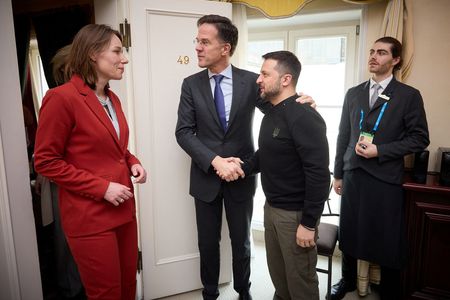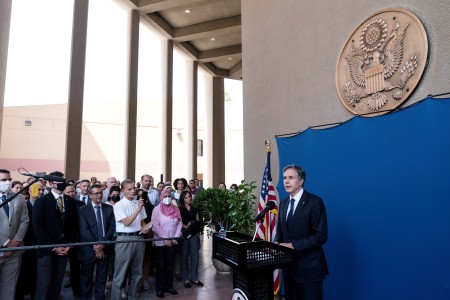By Daphne Psaledakis and Timour Azhari
WASHINGTON/BAGHDAD (Reuters) -The U.S. Treasury Department’s top sanctions official traveled to Baghdad on Sunday, a Treasury spokesperson said, as Washington seeks to counter Iran’s sanctions evasion in Iraq and bring the country’s financial sector in line with international standards.
Treasury’s Under Secretary for Terrorism and Financial Intelligence, Brian Nelson, traveled to Iraq from Sunday to Monday, where he met with senior Iraqi officials, including Prime Minister Mohammed Shia Al-Sudani, as part of work on countering illicit finance, the spokesperson said.
While on the trip, Nelson discussed with counterparts protecting Iraqi and international financial systems from criminal, corrupt and terrorist actors, the spokesperson said, adding that Washington would partner to protect Iraq’s financial sector “from abuse by Iran or other malign actors.”
The Iraqi government came to power with the support of powerful, Iran-backed parties and armed groups with interests in Iraq’s highly informal economy.
Nelson told Reuters on Monday that his meetings, including with the prime minister and central bank governor, were productive.
“I think we are heartened really from Treasury’s perspective by the transparency tools that the central bank of Iraq has put in place to identify illicit financial flows going trough the Iraqi financial system,” Nelson said.
But he warned that Iraq should remain aware of sanctions risks. “We will continue to monitor Iraqi individuals, companies and banks acting for and on behalf of U.S.-designated terrorist groups,” Nelson said.
CONDUIT FOR TERRORIST FINANCING
The United States on Monday identified Iraq’s Al-Huda Bank as a foreign financial institution of primary money laundering concern, accusing it of serving as a conduit for terrorist financing.
Alongside the finding, the Treasury’s Financial Crimes Enforcement Network proposed a rule that would sever the bank from the U.S. financial system by prohibiting domestic financial institutions and agencies from opening or maintaining a correspondent account for or on behalf of the bank.
Washington also slapped sanctions on the bank’s owner.
“Al-Huda Bank and its foreign sponsors, including Iran and its proxy groups, divert funds that could otherwise support legitimate business and the economic aspirations of the Iraqi people. These bad actors fuel violence that threatens the stability of Iraq and the lives of U.S. and Iraqi citizens alike,” the Treasury Department said in a statement.
Nelson’s visit comes as the U.S. seeks to crack down on a host of Iranian-backed proxies that have used Gaza, Iraq, Lebanon, Syria and Yemen to carry out attacks on Israeli, U.S. and other interests.
The United States imposed sanctions last week on Hamas-affiliated financial exchanges in Gaza, an Iraqi airline and backers of Iranian-linked militias in Iraq, accusing all of working with Iran’s elite military and intelligence unit.
Washington has called for Iraq to address continued risks of the misuse of dollars at Iraqi commercial banks, and in July barred 14 Iraqi banks from conducting dollar transactions as part of a wider crackdown on the illicit use of dollars.
With more than $100 billion in reserves held in the U.S., Iraq is heavily reliant on Washington’s goodwill to ensure oil revenues and finances do not face U.S. censure.
Iraq’s central bank governor has said Iraq is committed to implementing tighter financial regulations and combating the smuggling of dollars.
Nelson will travel to UAE, where Washington has also had concerns about sanctions evasion, after his visit to Iraq.
(Reporting by Daphne Psaledakis in Washington and Timour Azhari in Baghdad, Editing by Nick Zieminski, David Ljunggren and Ros Russell)



